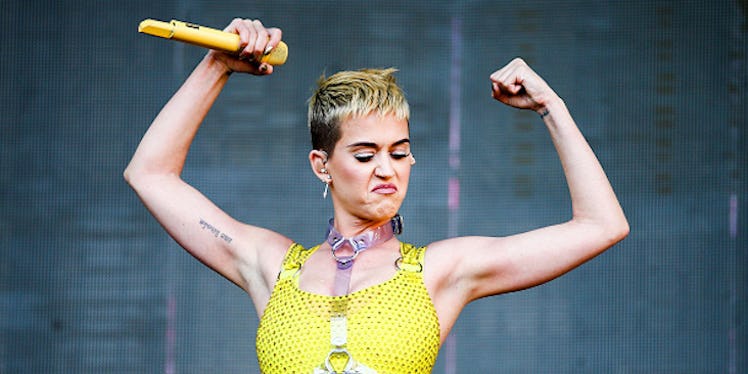
Why Hair Will Always Be Such A Powerful Form Of Expression For Women
Katy Perry recently revealed to her therapist that her new blonde pixie cut is so much more than just an image change meant to accompany her new album, Witness.
During the live streamed therapy session with Dr. Siri Singh, she revealed that her new cut was a decision based on her need to be liberated from her pop star image.
She told Dr. Singh that not only has she felt restricted by the "facade" that is her Katy Perry brand, but has also struggled with her mental health even to the point of having "suicidal thoughts" that left her feeling ashamed.
Perry shared that her cutting her hair was all part of her journey to healing.
She said,
I'm really strong as Katy Perry and then sometimes I'm not as strong as Katheryn Hudson. People like talk about my hair, right? They don't like it or they wish that it was longer. I so badly want to be Katheryn Hudson that I don't even want to look like Katy Perry anymore sometimes. That is a little bit of why I cut my hair, because I really want to be my authentic self 100 percent. It hurts when I don't feel like I can.
Katy Perry changing her hair as a form of liberating self-care is as relatable as her overall journey toward mental health.
Women Have Long Used Their Hair As A Power Tool.
In a world where a woman's body autonomy is often ridiculed or stripped away from her, hair switch-ups are a way to aesthetically exercise the freedom of choice and often mark a power recoup in other areas.
Think Rihanna, widely lauded as a hair chameleon and overall trend setter, who's most crucial career turning point was the now 10-year-old album, Good Girl Gone Bad (GGGB). After two albums (Music of the Sun and A Girl Like Me), her first image change was the GGGB era, circa 2007.
She formerly wore her hair in the classic long, and brownish-blonde style that other singers of the time, namely Beyoncé, also sported.
When Rihanna debuted her first GGGB single, "Umbrella," the album had a new sound and with it, an edgier look, which was a jet black asymmetrical bob.
When that album dropped, it seemed the real Rihanna emerged.
She was finally making music that she wanted to make, adding as many tattoos as she wanted, and basically making direct strides to being the "bad gal Ri Ri" the public has grown to shamelessly obsess over today.
The pop star has publicly acknowledged that the 2007 image change was an idea that she presented to her label after feeling confined to a straight-laced image for years.
She said in a 2010 interview with Bang Showbiz,
I wasn't 100 percent or even 75 percent in control of my image or my sound. I said, 'If you guys keep this perfect image of me, people will never notice me.' I kind of blended in. It was safe, the blonde, curly hair. It was a formula. I didn't want to be like all the other artists. I wanted to stand out.
And stand out she did.
Rihanna now goes through more hairstyles in a month than most women go through in a year, and it all started with her reclaiming her power as an artist and marking it with that unforgettable black bob.
Actress KeKe Palmer, who cut her hair in 2016, also revealed that she did so to break away from restrictive Hollywood beauty norms.
She said in an Essence interview,
I got very tired of wearing weaves. I was really over it and people kept telling me I had to wear them to get jobs and that didn't make much sense to me. I went to NY and did "Cinderella" [on Broadway] and during that time, I cut all my hair off into a little pixie and I was just so liberated. I feel honestly, you can be more feminine with your hair off because you're feeling yourself and you're bare. I don't need it to be beautiful.
Other Stars Have Also Made Strong Statements With Their Locks.
Hair has famously been used to convey individuality and unwillingness to conform.
Think Pink and her namesake fuchsia hair, Amber Rose and her bold, bald head, and even The Cosby Show's Lisa Bonet's hippie dreadlocks in the '80s.
Our patriarchal society constantly tries to dictate what looks are feminine (long hair), what detracts from intelligence (blonde hair) and what is beautiful (straight hair).
Thankfully, there are always women willing to resist the oppression that aims to limit the freedom of choice we have over our hair and every other area of our lives.